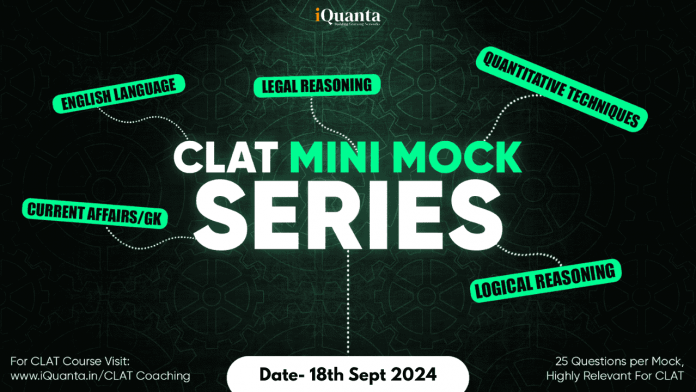iQuanta has launched a Mini Mock Series covering all the sections of the CLAT exam, these questions have been handpicked by our faculty based on the latest CLAT exam pattern.
Instructions:-
1. Attempt all the questions.
2. Once you have completed all the questions of a particular section click on the submit button for scores and explanations then move to the next sections.
3. For each correct answer, you receive 1 mark. For this mock, there is no negative marking.
English Language
Each set of questions in this section is based on a single passage. Please answer each question on the basis of what is stated or implied in the corresponding passage. In some instances, more than one option may be the answer to the question; in such a case, please choose the option that most accurately and comprehensively answers the question.
To be lucky, it’s often essential to be open and alert to the unexpected. Consider an entertaining experiment that the British psychologist Richard Wiseman carried out for a BBC TV show some time ago, which involved just two people: one who saw himself as ‘lucky’, and one who identified herself as ‘unlucky’. The researchers asked both participants to take separate trips to a coffee shop outside which they’d placed a £5 note on the pavement. Inside, someone posing as a successful businessman sat at the table by the counter. The ‘lucky person’ approached, spotted the money and picked it up. Inside, he ordered a coffee, sat next to the businessman and struck up a conversation with him. The self-described ‘unlucky’ person, on the other hand, failed to notice the money or talk to the businessman. Later, the researchers asked both participants how their day had been. The ‘lucky’ person reported having had a great day – he’d found money in the street, and made a new friend (who might lead him to additional opportunities). Meanwhile, the ‘unlucky’ person described her day as uneventful. So, although both participants had the same chances, only one was able to ‘see’ them.
Such an experiment – while lighthearted – shows that your mindset, and how you think about possibility in your life, can affect your ability to be alert when opportunity occurs. In fact, the terms ‘unexpected’, ‘extraordinary’ and ‘unlikely’ are misleading because accidents or coincidences happen all the time. But we must be able to see the opportunity in the moment.
Although being alert to the unexpected is vital for creating smart luck, there is another key factor: preparation. This is partly about removing the barriers to serendipity, both mental (your mindset) and physical (the spaces you live and interact in), such as: overloaded schedules; senseless meetings; and the inefficiencies throughout your day that rob you of time, curiosity and a sense of joy. You can prepare by strengthening your mental readiness to connect with opportunity and creating an environment that enables the use of your skills and available resources to act on the moment. An unprepared mind often discards unusual encounters, thereby missing the opportunities for smart luck. But this is a learned behaviour. Preparation is about developing the capacity to accelerate and harness the positive coincidences that show up in life.
Quantitative Techniques
Logical Reasoning
Directions: Read the passage and answer the following question.
The global sports market is expected to reach over 623 billion U.S. dollars, driven by the increasing popularity and participation in sports and fitness. A key factor in the success of any athlete is strength & conditioning, the science of improving athletic performance through specific exercises and training programs. Strength and conditioning are crucial as they not only enhance sports performance but also ensure athletes’ safety, longevity, and mental motivation in their chosen field.
Strength and conditioning are pivotal for several reasons. It improves overall performance by designing training regimens tailored to each athlete’s individual needs, helping athletes achieve their goals in a shorter amount of time and reducing the risk of injuries. It enhances athletes’ physical durability, especially in sports like Badminton, tennis, and football, where peak physical fitness is required. Through strength and conditioning, athletes can condition their bodies to withstand the rigours of these sports. Additionally, it fosters an athletic mindset, and the mental toughness that comes with being physically strong can help athletes perform better under pressure.
Common injuries like back pain, ankle sprains, ACL tears, hamstring strains, and shoulder impingement can be prevented with strength and conditioning. For instance, back pain can be avoided by improving core stability and strengthening the lumbar spine. Ankle sprains can be prevented with an appropriate warm-up routine and strengthening exercises that target the muscles around the ankle joint. ACL injuries can often be prevented with warm-up exercises, plyometrics, and strength exercises that target the hip and knee muscles. Hamstring strains can be prevented by improving flexibility and strength in the hamstrings, glutes, and hip muscles. Shoulder impingement can be prevented by strengthening the rotator cuff muscles as well as improving posture and correct technique.
The enhancement of performance among young athletes through strength and conditioning arises from improvements in power, speed, coordination, and endurance. Training methodologies encompass weights, plyometrics, and other techniques to nurture muscles essential for superior performance. For example, swimmers can augment stroke speed, power, and distance through targeted strength and conditioning exercises. Reactive strength training heightens the ability to generate rapid force, vital for explosive movements in sports such as sprinting, jumping, throwing, and cutting. Plyometric exercises further hone coordination and balance, fostering quick and agile movements. Additionally, endurance, a cornerstone of most sports, benefits from strength and conditioning, increasing an athlete’s stamina and optimizing oxygen delivery to muscles during exertion.
Legal Reasoning
Directions: Read the passage and answer the following question.
Privity of contract is a foundational principle in contract law, which asserts that only the parties directly involved in the contract have the legal standing to enforce or challenge its terms. This doctrine effectively precludes third parties—those not privy to the contract—from filing lawsuits pertaining to the contract’s stipulations. In essence, privity ensures that the obligations and benefits conferred by a contract are exclusive to the contracting parties, maintaining the integrity and specificity of their agreement.
In the context of Indian contract law, the concept of privity takes on a nuanced dimension. According to the Indian Contract Act, 1872, the notion of consideration is flexible, allowing for third-party considerations. This means that while a third party may provide consideration, this act alone does not grant them the right to enforce the contract. Privity in India is firmly tied to the identity of the contracting parties rather than the source or direction of the consideration. Thus, despite third-party considerations being permissible, privity remains unbreached, preserving the exclusivity of the contractual relationship.
The rationale behind this principle is grounded in the view of a contract as a private law that binds only the parties involved. When two or more parties enter into a contractual agreement, they are essentially creating a set of rules and obligations that govern their relationship. This contractual ‘law’ is inherently personal and specific to the signatories of the agreement. Allowing an external party to intervene or enforce the contract would undermine this personal governance, potentially leading to a misalignment of intentions and expectations that were originally negotiated and agreed upon.
This perspective is critical in maintaining the sanctity and predictability of contractual obligations. Parties entering into a contract do so with the understanding that their rights and responsibilities are shielded from external interference, except under specific legal provisions or exceptions recognized by law. This exclusivity fosters a clear, unambiguous environment where parties can negotiate and execute agreements with confidence, knowing that the terms will be upheld strictly between them.
Furthermore, Indian jurisprudence has consistently upheld the doctrine of privity, reinforcing that only those who are parties to the contract can seek redress or performance under its terms. This reinforces the contractual boundary, ensuring that obligations are not extended beyond the original parties without explicit consent or statutory provision. It aligns with the broader principle that contracts are a manifestation of mutual consent and intention, which should not be altered or diluted by extraneous parties.
In summary, privity of contract in Indian law underscores the personal and exclusive nature of contractual agreements. While third-party considerations are recognized, they do not erode the privity principle, which confines enforcement rights to the original contracting parties. This approach preserves the integrity of contracts as a private governance tool, ensuring that the rights and obligations are clear, predictable, and shielded from external disruptions. It upholds the notion that contracts are self-contained laws between the parties involved, creating a secure and reliable framework for private agreements.
Current Affairs & General Knowledge
A periodic review of India’s implementation of the UN-mandated International Covenant on Civil and Political Rights (ICCPR) was “successfully” concluded on Tuesday by experts of the Human Rights Committee in Geneva. The Indian delegation, co-led by the Ld. Attorney General for India [1] and Ld. Solicitor General of India Shri Tushar Mehta, also included Secretary(West) Shri Pavan Kapoor, and comprised senior officials from the Ministries of Women and Child Development; Social Justice and Empowerment; Electronics and Information Technology; Minority Affairs; External Affairs; Tribal Affairs; Home Affairs; and the Offices of Ld. Attorney General and Ld. Solicitor General. The Ministry of External Affairs (MEA) said the review demonstrated India’s commitment to engaging with the international human rights framework and its willingness to address concerns, while continuing its efforts towards protection and promotion of the rights of its citizens. The Human Rights Committee carried out the periodic report of India on how it implements the provisions of the ICCPR. The ICCPR, adopted by the UN General Assembly in 1966, is a multilateral treaty that commits nations to respect the civil and political rights of individuals. It came into force in 1976 The periodic review of India, which took place on July 15 to 16 saw the Indian delegation engaging in constructive dialogue with the members of the Human Rights Committee on a wide range of issues related to civil and political rights. “Questions were posed on diverse topics such as anti-corruption measures, non-discrimination, status of women and of minorities, counter terrorism and national security measures, judicial framework, privacy and data protection laws, new criminal laws, etc,” the MEA said in a statement.
It said India highlighted its success in the protection of rights of vulnerable groups, adding the country’s contributions to the evolution of the global human rights framework were also recalled. “During the discussions, the members of the Human Rights Committee spoke appreciatively of the traditions and ethos of India, rooted in principles such as pluralism, non-violence and diversity, which are in line with the essence of human rights,” the MEA said.
“It was also noted that India is a vibrant parliamentary democracy, which successfully concluded the largest democratic exercise recently,” it said.
The Human Rights Committee, comprising 18 independent experts serving in their individual capacity, monitors implementation of ICCPR and reviews reports of all countries by conducting periodic reviews, and then making observations and recommendations.
Enroll for CLAT Online Coaching by iQuanta




